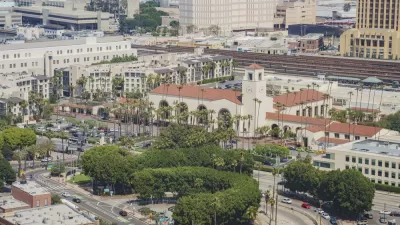Prolific and infamous developer Geoff Palmer rarely gives interviews. So it was an occasion when he appeared before an audience at the Lorenzo, his lavish student-housing complex, to recount the philosophy and practice of his controversial legacy.
Palmer is known, along with Tom Gilmore, for setting in motion the revitalization—or gentrification—of Downtown currently in full swing. In the Q&A with Planning Report publisher David Abel, he recounted how he got started developing downtown after the L.A. Riots, despite discouragement and disbelief from city planning, bankers, and brokers, let alone prospective tenants.
Ultimately, Abel notes, Palmer "changed the model" for building downtown. The $330-million Lorenzo also represents a new format for student housing, and Palmer explains the project's financial model, its relationship to USC, and the lessons learned from the development process, which was beset by opposition from neighborhood activists. Audience members, invited by the Urban Land Institute, nodded as he said, "I learned that I will not buy land that requires discretion… I’m not going to take something that I’ve got to rezone."
Palmer speaks frankly about his opposition to inclusionary housing, which he famously fought to strike down in Los Angeles in 2009, readily addressing himself to his critics. "I think it's immoral. 'Thou shalt not steal'—and certainly not by force of violence," he says.
"Why is it that these people think that real-estate developers should give 15 percent of their profits away? They don’t ask it of grocery stores, gas stations, or haberdasheries. They only ask real-estate developers. Why do these social engineers think that private individuals should be subsidizing these people? ... It’s totally un-American."
The conversation is wide-ranging and open, also covering Palmer’s trademark "Italianate" design and how his choice to build what many have called "fortresses" is a response to how he views the conditions and needs of Los Angeles.
It’s a clear glimpse into an insider perspective on the practicalities, politics, workarounds and alliances involved in becoming one of the most famous, and most contested, developers in Los Angeles.
Read the interview in The Planning Report.
FULL STORY: Palmer 'Re-Gentrified' Downtown LA, Despite Doubters and Design Criticism

Maui's Vacation Rental Debate Turns Ugly
Verbal attacks, misinformation campaigns and fistfights plague a high-stakes debate to convert thousands of vacation rentals into long-term housing.

Planetizen Federal Action Tracker
A weekly monitor of how Trump’s orders and actions are impacting planners and planning in America.

In Urban Planning, AI Prompting Could be the New Design Thinking
Creativity has long been key to great urban design. What if we see AI as our new creative partner?

King County Supportive Housing Program Offers Hope for Unhoused Residents
The county is taking a ‘Housing First’ approach that prioritizes getting people into housing, then offering wraparound supportive services.

Researchers Use AI to Get Clearer Picture of US Housing
Analysts are using artificial intelligence to supercharge their research by allowing them to comb through data faster. Though these AI tools can be error prone, they save time and housing researchers are optimistic about the future.

Making Shared Micromobility More Inclusive
Cities and shared mobility system operators can do more to include people with disabilities in planning and operations, per a new report.
Urban Design for Planners 1: Software Tools
This six-course series explores essential urban design concepts using open source software and equips planners with the tools they need to participate fully in the urban design process.
Planning for Universal Design
Learn the tools for implementing Universal Design in planning regulations.
planning NEXT
Appalachian Highlands Housing Partners
Mpact (founded as Rail~Volution)
City of Camden Redevelopment Agency
City of Astoria
City of Portland
City of Laramie





























